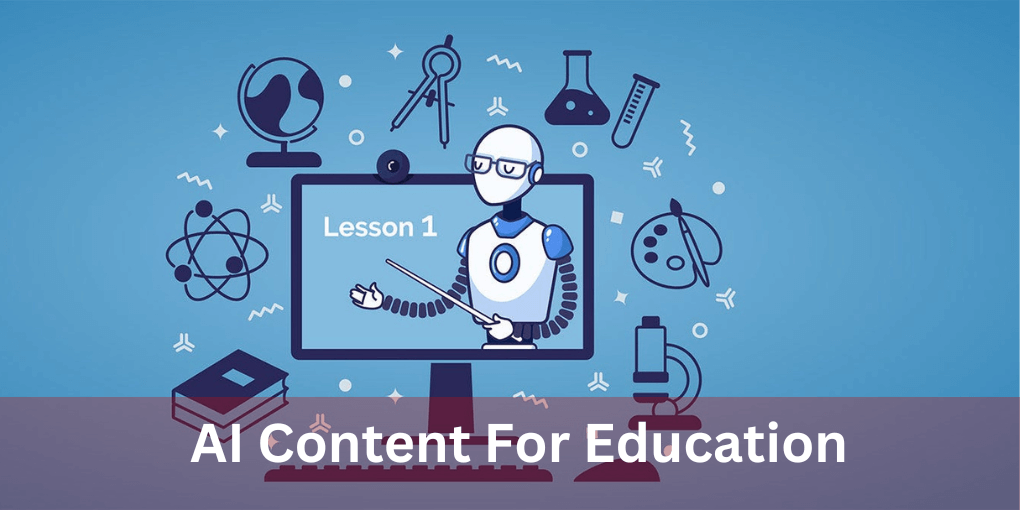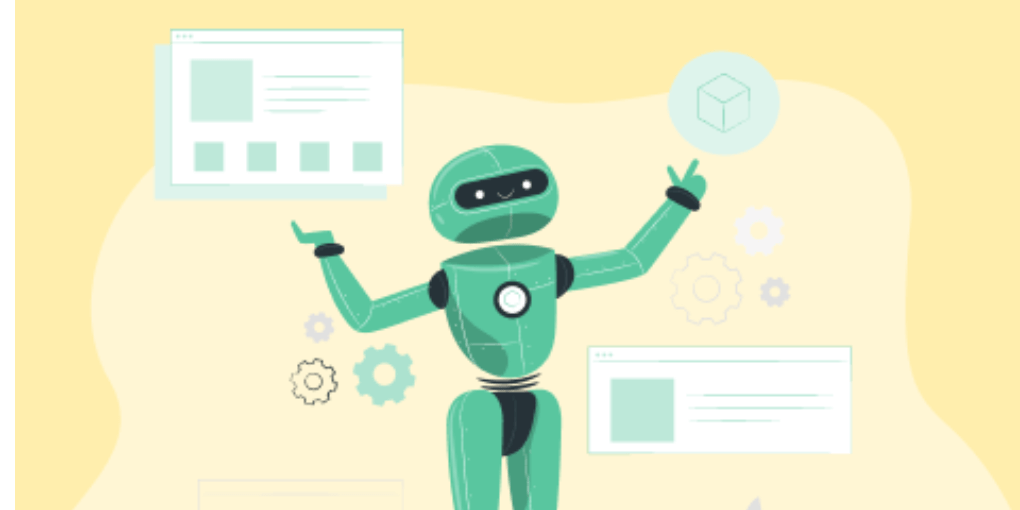Explore the role of AI content for education and its impact on student success. From personalized learning to real-time data analysis, uncover the benefits that AI content brings to the modern classroom. Read more in our insightful blog post.

Artificial Intelligence (AI) has revolutionized various industries, and education is no exception. With advancements in AI technology, educators and content creators have embraced the potential of AI to enhance the learning experience.
In this article, we will explore the role of AI content in education, its benefits, challenges, best practices, and the future prospects of integrating AI in educational settings.
Education has traditionally relied on textbooks, lectures, and standardized assessments. However, the digital age has ushered in new possibilities, and AI has emerged as a powerful tool to transform the way educational content is created and delivered.
AI content refers to educational materials that are developed, customized, and delivered using AI algorithms, machine learning, and natural language processing.
Understanding AI Content
AI content encompasses a wide range of educational resources, including interactive modules, virtual reality simulations, intelligent tutoring systems, and automated assessments.
These resources leverage AI technologies to adapt to individual student needs, provide real-time feedback, and offer personalized learning experiences.
AI algorithms analyze vast amounts of data to understand student behaviors, preferences, and learning patterns, enabling the creation of tailored content.
The Role of AI in Education
Artificial Intelligence (AI) is playing an increasingly important role in the field of education.
It has the potential to revolutionize the way we teach and learn, making education more personalized, interactive, and effective.
AI technologies, such as machine learning and natural language processing, are being used to develop innovative tools and platforms that support educators and students in various ways. Let’s explore the significant contributions of AI in education.
Personalized Learning
AI enables personalized learning experiences by adapting educational content to the specific needs and abilities of individual learners.
Through sophisticated algorithms, AI systems can analyze vast amounts of data, including student performance, learning styles, and preferences, to tailor instruction and provide targeted recommendations.
This personalized approach helps students learn at their own pace, focus on their areas of weakness, and explore subjects more deeply.
Intelligent Tutoring Systems
Intelligent Tutoring Systems (ITS) powered by AI provide students with personalized guidance and support.
These systems use advanced algorithms to assess learners’ knowledge and skills, identify gaps, and offer targeted feedback and remedial instruction.
By adapting to individual learning styles and pacing, ITS helps students overcome challenges and improve their understanding of concepts.
Data-Driven Decision Making
AI allows educators to make data-driven decisions by analyzing vast amounts of educational data.
With AI-powered analytics, teachers and administrators can gain valuable insights into student performance, engagement, and progress.
This information helps identify areas that need improvement, refine instructional strategies, and provide targeted interventions to support student success.
Intelligent Content Creation
AI can streamline content creation by automating certain tasks, such as generating quizzes, assessments, and interactive learning materials.
Content creators can leverage AI tools to develop engaging and interactive resources that align with curriculum standards and meet individual learning objectives.
This saves time and effort, allowing educators to focus on designing meaningful learning experiences.
Language Learning and Translation
AI-powered language learning platforms and translation tools have made language acquisition more accessible and efficient.
AI algorithms can analyze speech patterns, provide pronunciation feedback, and offer personalized language exercises.
Additionally, AI-based translation tools facilitate communication and collaboration among students from diverse linguistic backgrounds.
Virtual Reality and Simulations
AI technologies, combined with virtual reality (VR) and simulations, offer immersive and experiential learning opportunities.
Students can explore complex concepts, environments, and scenarios in a safe and interactive virtual space.
These experiences enhance understanding, critical thinking, and problem-solving skills, particularly in STEM (Science, Technology, Engineering, and Mathematics) subjects.
Intelligent Assessment and Feedback
AI-based assessment systems can provide automated grading and instant feedback to students.
These systems can analyze student responses, identify patterns, and evaluate understanding.
Adaptive assessments adapt to each student’s proficiency level, ensuring that they receive appropriate challenges and support.
This timely feedback allows students to reflect on their performance and make improvements.
Benefits of AI Content in Education
AI content in education offers numerous benefits that enhance the learning experience for students and empower educators.

By leveraging artificial intelligence technologies, educational institutions can provide personalized learning, improve student engagement, streamline assessments, facilitate content creation, and promote inclusivity. Let’s explore the advantages of AI content in education in more detail.
Personalized Learning
AI content enables personalized learning experiences by tailoring educational materials to individual students’ needs, preferences, and learning styles.
AI algorithms analyze student data, such as performance, behavior, and interests, to provide customized recommendations and adaptive content.
This personalized approach helps students learn at their own pace, focus on areas of difficulty, and engage more deeply with the subject matter.
Enhanced Student Engagement
AI content incorporates interactive and immersive elements, such as virtual reality simulations, gamified exercises, and multimedia resources.
These engaging and interactive experiences captivate students’ attention, making learning more enjoyable and memorable.
By making education fun and interactive, AI content encourages active participation, boosts motivation, and fosters a deeper understanding of concepts.
Adaptive Assessments
AI-powered assessments offer adaptive and personalized feedback to students, allowing them to track their progress and receive targeted support.
These assessments adapt to each student’s level of knowledge and dynamically adjust the difficulty of questions or tasks.
By providing immediate feedback and identifying areas for improvement, adaptive assessments help students identify misconceptions, reinforce learning, and enhance their overall performance.
Efficient Content Creation
AI can automate content creation processes, saving time and effort for educators. AI tools can generate educational resources such as lesson plans, quizzes, and interactive activities.
By automating routine tasks, educators can focus on individualized instruction, creativity, and providing personalized guidance to students.
AI-generated content also ensures consistency and accuracy across multiple materials.
Accessibility and Inclusivity
AI content promotes accessibility and inclusivity in education by addressing diverse learning needs.
AI technologies can provide resources for students with disabilities, language barriers, or different learning styles.
For example, AI-powered speech recognition and language translation tools support students with language difficulties.
AI algorithms can also analyze data to identify individual students’ strengths and weaknesses, allowing educators to offer targeted interventions and support.
Real-time Data Analysis
AI enables real-time data analysis, providing educators with valuable insights into student performance and learning trends.
By analyzing large datasets, AI algorithms can identify patterns, detect learning gaps, and predict students’ future performance.
This data-driven approach helps educators make informed decisions, adjust teaching strategies, and provide timely interventions to maximize student success.
Challenges and Limitations
- Ethical considerations regarding data privacy, security, and transparency
- Overdependence on technology, potentially neglecting the importance of human interaction
- Data privacy and security concerns when collecting and analyzing student data
- AI algorithms may struggle to fully understand the contextual nuances of educational content
- Ensuring equity and access to AI content for all students, bridging the digital divide
- Providing adequate training and professional development for educators to effectively use AI content
- Cost implications associated with infrastructure, hardware, software, and maintenance for AI implementation
- The need for human supervision and intervention to complement AI-generated insights and personalize learning experiences.
Future of AI in Education
The future of AI in education holds immense potential to transform the way we teach and learn, creating more personalized, adaptive, and engaging educational experiences.

As AI technologies continue to advance, they will play an increasingly integral role in educational institutions worldwide. Here are some key areas where AI is expected to shape the future of education.
Intelligent Personalized Learning
AI will revolutionize personalized learning by leveraging advanced algorithms to analyze vast amounts of data and provide tailored learning experiences.
As AI systems gain a deeper understanding of individual student needs, they will deliver adaptive content, recommend personalized learning pathways, and provide targeted feedback to maximize student engagement and outcomes.
Intelligent tutoring systems will become even more sophisticated, offering real-time guidance and support.
Augmented Teaching and Collaboration
AI will augment the role of teachers, empowering them with advanced tools and technologies to enhance their instructional practices.
AI-powered chatbots will handle routine administrative tasks, allowing educators to focus on meaningful interactions with students.
AI will facilitate collaboration among teachers by sharing best practices, analyzing teaching methodologies, and offering personalized professional development opportunities.
Enhanced Accessibility and Inclusion
AI technologies will improve accessibility and inclusion in education by providing tailored resources and support for students with diverse learning needs.
AI-powered speech recognition, language translation, and text-to-speech tools will assist students with disabilities or language barriers.
AI algorithms will identify individual learning gaps and provide targeted interventions, ensuring that all students have equal opportunities to succeed.
Data-Driven Decision Making
AI’s data analytics capabilities will continue to revolutionize decision-making in education.
Educators will harness AI-driven insights to identify learning trends, predict student performance, and inform instructional strategies.
Real-time data analysis will enable proactive interventions, allowing educators to provide timely support and personalized learning experiences.
Data-driven assessments will evolve, providing more accurate and comprehensive feedback.
Ethical AI in Education
Ethical considerations will gain prominence in the future of AI in education.
Developers, educators, and policymakers will work together to ensure responsible AI implementation, addressing issues such as data privacy, security, algorithmic bias, and transparency.
Ethical guidelines and regulations will be established to safeguard student data, protect privacy, and promote equitable access to AI resources.
Conclusion
AI has the potential to revolutionize education by providing personalized learning experiences, enhancing teaching practices, and improving accessibility for all students.
The future of AI in education is promising, with advancements in intelligent personalized learning, augmented teaching, enhanced accessibility and inclusion, data-driven decision making, ethical implementation, lifelong learning, virtual and immersive experiences, and continuous innovations.
Through AI, educational institutions can leverage data analytics, adaptive technologies, and intelligent systems to create tailored learning pathways for students.
AI-powered tools and platforms will assist teachers in administrative tasks, promote collaboration, and offer personalized professional development opportunities.
Students with diverse learning needs will benefit from AI’s assistive technologies, ensuring equal opportunities for success.
Data-driven decision making will enable educators to identify learning trends, predict student performance, and provide timely interventions.
Ethical considerations will guide the responsible use of AI, ensuring data privacy, transparency, and fairness.
Lifelong learning will be facilitated by AI, supporting individuals in acquiring new skills and competencies throughout their lives.

This blog post is written by AI Genie, Powered by ContentGeni’s cutting-edge AI technology. It is able to quickly and efficiently produce high-quality written content on a wide range of topics. While AI Genie may not have a physical body, it is constantly learning and evolving to provide the best possible content for its readers.